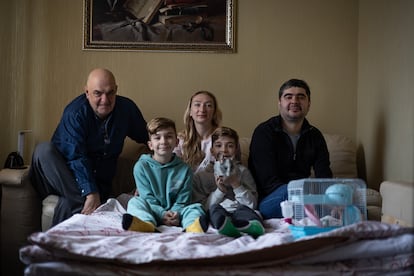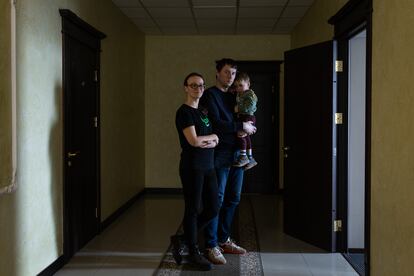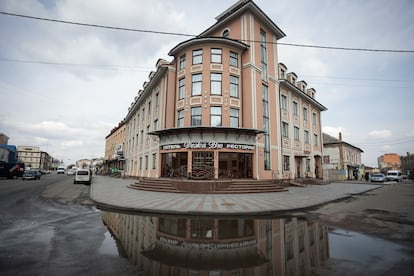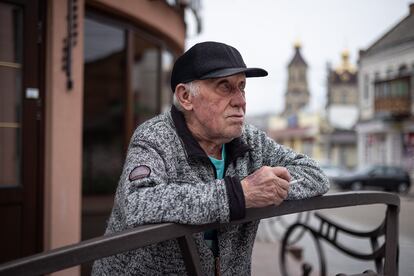Living in a hotel while waiting for Russia’s war to end: It’s a lot like ‘Groundhog Day’
Several families have been staying in an establishment in Berdichev, a hundred kilometers from Kyiv, as they wait for the conflict to stop


Vasil Tokarchuk says the best way to understand his life this past month is to watch the 1993 comedy Groundhog Day. “I feel like Bill Murray, getting up every morning in the same hotel bed and repeating the same situations every day,” explains this executive from a tech multinational in Kyiv. Since March 9, Tokarchuk and his family have been staying in a hotel called Déja Vu in Berdichev, a town of 75,000 inhabitants located 80 miles (130 km) from the Ukrainian capital of Kyiv. His plan is to remain in room 301 until it is safe to return to the capital.
The irony of the hotel’s name has not escaped him or the nine other families who have been living at the Déjà Vu. They all arrived from Kyiv province in an effort to escape the Russian offensive in Ukraine. Every day, they greet one another in the kitchen, when they pass by one another in the hallways or smoking at the entrance of the building, or in the grocery shop out front, which sells dried fish, bread, cheese, and lets them fill up their containers with water. They say hello, but don’t interact much beyond that, nor have tried to introduce themselves, the guests tell EL PAÍS.
Some hardly leave the hotel room, such as the young woman dressed in punk fashion who is holed up with her cat. “Perhaps we have not fraternized with the other guests because we are computer engineers and are a bit more introverted, or perhaps it’s because the circumstances aren’t ideal to make friends,” says Denis Makarov, 36, the father of the youngest hotel guest, two-year-old Leonid.

Leonid is the only guest in the hotel who breaks the monotony of the place. He screams, runs away and cries. Everyone is patient with him and watches out that he doesn’t hurt himself. “He doesn’t understand what’s happening, he doesn’t know why we are shut up here,” says his mother, Alona. “It’s a relief for us not to have to explain it to him, because I don’t know if we could do it.”
Denis and Alona work full-time from their computers, and Leonid quickly gets bored watching cartoons. “Our life consists of having breakfast, working, walking around town for a bit, having dinner, working a bit more and sleeping,” says Denis. “The weekend is when we have the most free time for Leonid and it’s when we can take the iPad off him.”
There are two other kids in the hotel, Yura and Andrii, the children of Vasil and Svetlana Tokarchuk. They are 10-year-old twins. They also spend many hours glued to their screens, playing video games on the sofa of the hotel lobby. “They have better Wi-Fi cover there than in the room,” their father explains. Yura and Andrii also have five hours of remote learning every day as schools in Ukraine are now giving online classes.

The Tokarchuks decided to flee on February 24, just 24 hours after Russian President Vladimir Putin launched the offensive in Ukraine. They quickly packed what they could in the car and drove to a house in the country that belonged to Vasil’s father, Oleksandr Tokarchuk. The home was near the town of Makariv, just 70 kilometers west of Kyiv. But Russian troops occupied the area and soon the family could hear the shelling. The day the windows were smashed was the day they decided to get even further away from the capital. In one of their neighbor’s gardens, three men were killed by Russian troops when they tried to stop them from looting a store, says Tokarchuk.
Inna Kotoroschuk has been a receptionist at Déja Vú hotel for four years. She and two colleagues cover 24-hour shifts. She says that the hotel was opened in 2011, but doesn’t know the story behind its name. During her time here, the business has been faced with one crisis after the other: first two years of the pandemic and now a war. The establishment saw the biggest demand between the end of February and the beginning of March, when tens of thousands of residents fled the conflict in the north and the east of the country. “There were no vacancies, neither here nor in any private apartment in Berdichev,” she says. Today, of the 39 rooms in the hotel, around a dozen are usually occupied.
Not all guests are there for the long haul, some are just passing through. Leo Kallash spent one night at the Déjà Vu on his way back to Kyiv. He was taking back humanitarian goods that he had picked up in Slovakia, 650 kilometers away. The war for him means coming and going between the capital and the EU countries on the border of Ukraine.

So why have the guests of Déjà Vu decided to stay in Berdichev? There are safer cities in the west of Ukraine. One reason, they say, is its proximity to Kyiv, the other is the cost: between €15 and €30 a night, depending on the size of the room. “In western areas, such as Lviv or the Transcarpathian region, the prices have gone up a lot. There are people making money off the situation,” says Tokarchuk.
Mikola Terentievich and his wife are staying at the hotel thanks to a group of volunteers, who are covering the cost. Terentievich is 85 years old and his routine at the hotel centers on going out for a smoke and chatting with Inna or the security guard. He was born before the Second World War, but does not want to talk much about his childhood, or the Soviet Union or the Russian invasion that has kicked him out of his home. Every afternoon, just before the 8pm curfew, he smokes his last cigarette and goes to the hotel lobby to express the same concerns as the day before: he misses his village and doesn’t want to die far from it.
Tu suscripción se está usando en otro dispositivo
¿Quieres añadir otro usuario a tu suscripción?
Si continúas leyendo en este dispositivo, no se podrá leer en el otro.
FlechaTu suscripción se está usando en otro dispositivo y solo puedes acceder a EL PAÍS desde un dispositivo a la vez.
Si quieres compartir tu cuenta, cambia tu suscripción a la modalidad Premium, así podrás añadir otro usuario. Cada uno accederá con su propia cuenta de email, lo que os permitirá personalizar vuestra experiencia en EL PAÍS.
¿Tienes una suscripción de empresa? Accede aquí para contratar más cuentas.
En el caso de no saber quién está usando tu cuenta, te recomendamos cambiar tu contraseña aquí.
Si decides continuar compartiendo tu cuenta, este mensaje se mostrará en tu dispositivo y en el de la otra persona que está usando tu cuenta de forma indefinida, afectando a tu experiencia de lectura. Puedes consultar aquí los términos y condiciones de la suscripción digital.








































